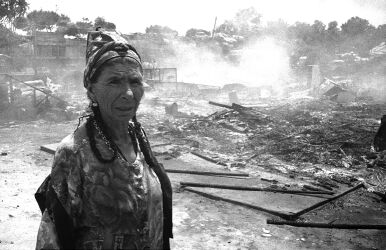Abuse in Romani camps in Italy
15 August 2001
According to ERRC field research, on June 22, 2001, municipal and state police raided the camp Casilino 900, on the southern periphery of Rome. According to one camp inhabitant, Mr D.G., the police checked a number of cars and confiscated several on grounds that they lacked proof of insurance. Similarly, the Rome-based civic association Arcireported that at around 7AM on May 31, 2001, a police unit of five officers entered the camp of Vicolo Savini on the outskirts of Rome, home to approximately five hundred Roma, and took twenty Romani men into custody. The men were taken away in a police van, reportedly for identity checks. Arci stated that none of the twenty men have residence permits. The men were returned to the camp approximately twenty-four hours after first being detained, without being charged with any crime.
In another case, on May 20, 2001, at around 7AM, police entered the abandoned farmhouse at Via Camp Salone, on the southern periphery of Italy's capital, where approximately 100 Roma live, according to reports by the Italian-based non-governmental organisation 3 Febbraio and ERRC field research. Around thirty Roma were taken into police custody for identity checks. Five were released after around fourteen hours of detention. The other twenty-five had not returned to the camp as of August 22, 2001, and there was no information as to their whereabouts.
Another of the camps, Tor Carbone, also on the outskirts of the capital city, was the site of what 3 Febbraio and the victims consider to have been an arson attempt motivated by racial animus. On April 12, 2001, at approximately 12 noon, a door on the ground floor of an abandoned farmhouse at the site of the camp caught fire. The cause of the fire, which occurred when most of the inhabitants were not present, has been reportedly attributed to what fire department inspectors identified as an "inflammable liquid." However, the police did not appear to be treating the fire as a racially motivated attack. Mr T.L., a 32-year-old Romani man, told the ERRC, "The police came to me and said that obviously we [Roma] had been fighting and that they suspected that one of two brothers living there had started the fire because he was angry. When I asked him why we would set our own house alight, he told me to be quiet. I also told him that we were not even there when the fire started."
 |
| Ms M.L., in front of burning Romani shacks in the Casilino 900 camp in Rome, June 10, 2000. No one was injured in the blaze, but eight shacks and possessions including valuables and documents were destroyed. The cause of the fire has not been officially identified. Photo: Stefano Montesi |
In other news relating to the Roma of Tor Carbone, according to information from the Italian non-governmental association 3 Febbraio, Romani inhabitants from the unauthorised camp left and occupied an abandoned site at Via Appia Nuova 801 on the morning of March 28, 2001. The sixty Roma who made the move cited poor living conditions at Tor Carbone, where there is no water, electricity or sewage system, as the reason for their move. On the morning of March 31, 2001, four police officers arrived at Via Appia Nuova and ordered the Roma to leave, stating that the owner of the property had filed a complaint. According to witnesses interviewed by 3 Febbraio, two hours after their first visit, three armoured police cars with approximately seventy police officers in riot gear arrived at the site and told the Roma to leave the property or else they would be arrested. The Roma left the site and returned to the Tor Carbone camp the same afternoon.
3 Febbraio has been publicly campaigning for equal housing rights for Roma. On March 8, 2001, more than one hundred protestors marched on the centre of Rome carrying banners calling for "homes for Roma" and stating that "Nomad is a misnomer". Italian authorities regard Roma as "nomads" and this justification provides the basis for racially segregated substandard housing arrangements. For further information on the situation of Roma in Italy, see the ERRC country report, Campland: Racial Segregation of Roma in Italy, available at www.errc.org.
(3 Febbraio, Arci, ERRC)




